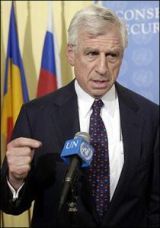U.S. waters down Sudan resolution, but opposition lingers
By TAREK EL-TABLAWY, Associated Press Writer
UNITED NATIONS, Sep 17, 2004 (AP) — The United States toned down a resolution on Sudan to win support from China, Russia and other Security Council members who fear the threat of sanctions against Khartoum could complicate efforts to end the looting and killing in the Darfur region.
 With Washington pressing for a vote, possibly before the end of the weekend, Secretary-General Kofi Annan called for urgent action by the council and the international community to stop the attacks on civilians.
With Washington pressing for a vote, possibly before the end of the weekend, Secretary-General Kofi Annan called for urgent action by the council and the international community to stop the attacks on civilians.
He accused Sudan of failing to rein in militias blamed for killing villagers in the desolate western region. Annan said the government forces and rebels in Darfur were guilty of cease-fire violations.
Annan also announced he was sending U.N. High Commissioner for Human Rights Louise Arbour and a special adviser on genocide, Juan Mendes, to Sudan to see what can be done immediately to protect civilians.
“Civilians are still being attacked and fleeing their villages even as we speak, many months after the government committed itself to bring the militias under control,” Annan told reporters Thursday. “The cease-fire is also being violated by both groups. Both sides have to stop violating the cease-fire.”
U.S. Ambassador John Danforth strongly backed Annan’s call for quick action, saying Annan’s comments “helped create the sense of urgency. We have to act quickly.”
“I think time is of the essence, I really do, when the reports are that 10,000 people are dying every month, then every day counts,” he said.
The latest U.S. draft resolution still threatens sanctions if the Sudanese government doesn’t curb the militias and start to disarm them and punish the perpetrators _ and if it doesn’t cooperate with the African Union. A new phrase was added saying that determination would be made by the council after consultations with the AU.
Key changes included that it urges Sudan to “refrain” from conducting military flights in and over the Darfur region. The previous version had called on the government to “cease” all military flights.
The new draft strongly endorsed an expanded African Union monitoring force, and it stated more clearly that while Sudan had met some obligations, it hadn’t met all of them “as expected by the council.”
“This draft is essentially the same as what we’ve had before,” Danforth said. “The goal is to get as many votes as we can, but still maintain the substance of the resolution. The key to the resolution is getting the AU in, and providing maximum support for it.”
Danforth dismissed the possibility that the resolution may have been too diluted.
“We wouldn’t do that,” he said. “We would not create something that looked as though this is almost encouraging the government of Sudan….We’re going to make it clear that, first of all, the government of Sudan is not in compliance with previous resolutions.”
Some council members continued to voice concern over the new U.S. draft.
The resolution needs to be one “which would not destroy the atmosphere, destroy the delicate working relations now between the Secretariat and the Sudanese,” said China’s U.N. Ambassador Wang Guangya.
He called for wording that would “be helpful for a solution; not a resolution that will make the matter worse, or make the situation on the ground more complicated.” He added that China would be amenable to another version being proposed.
Another key opponent, Pakistan, said the revised draft did little to address its main concerns.
“We were happy with the fact that some of our suggestion were taken onboard,” Munir Akram, Pakistan’s U.N. ambassador, said after the council discussed the resolution in a late afternoon session. “But the major problems are still there.”
“The major problems are with the sanctions issue. We have said that we don’t think that sort of pressure is justified or necessary, and could be counterproductive,” said Akram.
